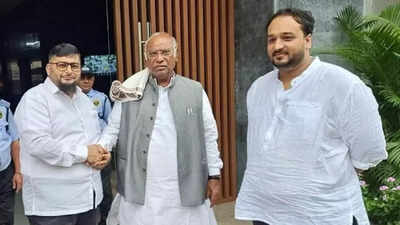


Dr. Abraham Mathai, a former Vice-Chairman of Maharashtra State Minorities Commission, has written to the President of the United Nations Human Rights Council (UNHRC) to intervene and secure the release of jailed Iranian Nobel Peace Prize Laureate, Ms. Narges Mohammadi, on humanitarian grounds. Mohammadi, who has been imprisoned by Iran for 10 years, is in a precarious state of health and urgently needs comprehensive medical treatment. Ahead of Iran's review under the UN Human Rights Council's Universal Periodic Review, Mathai is urging UNHRC to compel the Iranian authorities to release Mohammadi so she can receive proper care for her serious medical conditions.
Iranian Nobel Peace Prize Laureate Narges Mohammadi Languishes in Prison, Faces Grave Health Risks
Dr. Abraham Mathai, a former Vice-Chairman of Maharashtra State Minorities Commission, has penned an urgent letter to the President of the United Nations Human Rights Council (UNHRC), appealing for intervention to secure the release of Iranian Nobel Peace Prize Laureate, Ms. Narges Mohammadi, on humanitarian grounds.
Background:
Narges Mohammadi, a prominent human rights defender, has been imprisoned in Iran since 2015. She has been subjected to severe torture and ill-treatment during her time behind bars, resulting in serious health issues. In October 2022, she was sentenced to an additional 10 years in prison on charges of "propaganda against the state."
Health Concerns:
Mohammadi is currently in a precarious state of health, suffering from seizures, heart problems, and severe migraines. She desperately requires comprehensive medical treatment that is unavailable in the prison environment. Her condition has deteriorated in recent months, and her family fears for her life.
International Appeal:
Dr. Mathai's letter to the UNHRC highlights the urgency of Mohammadi's situation and urges the Council to intervene to secure her release. He stresses that Iran is violating its obligations under international law by denying Mohammadi adequate medical care and that her continued imprisonment is a violation of human rights.
Ahead of Iran's UNHRC Review:
Mathai's appeal comes ahead of Iran's review under the UNHRC's Universal Periodic Review (UPR), a mechanism that assesses countries' human rights records. He urges the UNHRC to compel Iran to release Mohammadi so that she can receive the medical attention she urgently requires.
Top 5 FAQs:
1. Why is Narges Mohammadi in prison? She is imprisoned on charges of "propaganda against the state" for advocating for human rights and civil liberties.
2. What is the current state of her health? She is suffering from severe seizures, heart problems, and migraines. Her condition has deteriorated significantly in recent months.
3. What is the role of the UNHRC in this case? The UNHRC is being urged to intervene and secure Mohammadi's release on humanitarian grounds.
4. What is the Universal Periodic Review (UPR)? It is a UNHRC mechanism that reviews countries' human rights records.
5. What action is Dr. Abraham Mathai taking? He has written a letter to the President of the UNHRC, appealing for intervention to secure Mohammadi's release.

While conducting routine operations on Sunday, two separate crashes involving US Navy aircraft occurred over the South China Sea, coinciding with President Trump's visit to Asia. The first involved a MH-60R Sea Hawk helicopter from the USS Nimitz, and the second involved a Boeing F/A-18F Super Hornet fighter jet. Luckily, all personnel involved were rescued without any injuries reported.

In a strong statement, President Asif Ali Zardari reiterates Pakistan's unwavering stance on the Kashmir dispute, calling India's claims on the territory illegal and in violation of international law and UN resolutions. He criticizes the recent remarks by Afghan leadership, highlighting the documented fact of terrorist attacks targeting Pakistani civilians and urging Kabul to take action against these militant elements. Zardari stresses that the fight against terrorism is a collective responsibility and Pakistan will not compromise its sovereignty or national security.

A tragic bus accident in Andhra Pradesh, India, which claimed the lives of 19 passengers, has been linked to a drunken biker, B Shiva Shankar. According to forensic reports and police investigations, the biker's reckless and intoxicated driving caused the initial crash that led to the bus fire. The bus was also carrying a consignment of smartphones and electric batteries, intensifying the fire and explosion. The second bus driver, who was reportedly sober, is cooperating with the investigation as police continue to file cases based on evidence and eyewitness accounts.

Indian Prime Minister Narendra Modi declared that the year 2026 will be marked as the "ASEAN-India Year of Maritime Cooperation" during the 22nd ASEAN-India Summit. This announcement highlights India's growing alignment with the ASEAN bloc, with Modi emphasizing the importance of the partnership in terms of strategic and economic cooperation. The Summit's theme of "Inclusivity and Sustainability" also reflects the shared priorities of both India and ASEAN, with joint efforts in areas such as digital inclusion, food security, and resilient supply chains. In addition to strategic cooperation, Modi also highlighted the expansion of collaboration in other areas such as education, tourism, and cybersecurity, while acknowledging the new member Timor-Leste and extending condolences to Thailand. Looking ahead, Modi expressed confidence in the long-term vision of ASEAN and India's development goals, stating that the 21st century belongs to both India and ASEAN.

During his virtual address to the 22nd ASEAN-India Summit, Prime Minister Narendra Modi highlighted the shared cultural and historical ties between the two regions and stressed the importance of ASEAN in India's Act East Policy. He reaffirmed India's commitment to ASEAN centrality and hailed the ASEAN-India Comprehensive Strategic Partnership as a foundation for regional growth and global stability. With Malaysia as the current ASEAN chair and the Philippines set to take over in 2026, discussions at the upcoming East Asia Summit will focus on Indo-Pacific security and regional stability.

During their stay in Indore for the Women's Cricket World Cup, two Australian players were molested by Aqueel Khan, a known criminal with a history of offenses. The man was caught after an eyewitness noted down the number plate of his motorcycle, allowing the police to track him down through CCTV footage. The Australian team, who were staying at Radisson Blu Hotel in Indore, reacted strongly to the incident and filed a complaint with the police. The Madhya Pradesh Cricket Association has condemned the incident and offered support to the affected players.

The leaders of five European countries, including PM Keir Starmer and Ukrainian President Volodymyr Zelensky, gathered in London to address the ongoing war in Ukraine. Starmer declared that Russian President Vladimir Putin is not serious about pursuing peace, while Zelensky thanked the US for imposing new sanctions on Russia. Outside of the summit, Ukrainians shared their experiences and fears of living in a warzone.

India and the US are on the verge of finalizing a trade deal, with both sides making significant progress and ironing out most issues. Union Minister of Commerce and Industry, Piyush Goyal, clarified that India will not succumb to pressure and will only enter into a deal that is fair and beneficial for both countries. Furthermore, Goyal emphasized that India's approach is driven by a long-term vision, rather than momentary pressure or deadlines.

Delhi Police has arrested two ISIS operatives who planned to carry out blasts during Diwali celebrations in South Delhi. The suspects were reportedly radicalised online and had conducted recce of busy locations to inflict maximum casualties. Police believe the accused were in touch with foreign handlers and are looking into potential links to Pakistan's ISI. Investigations are ongoing to determine if the suspects have attempted to recruit others in Delhi and Bhopal.

In recognition of World Polio Day, Navi Mumbai joined the global effort to eradicate the paralyzing and vaccine-preventable disease by hosting an End Polio Now Laser Display. This initiative, organized by the Rotary Club of Navi Mumbai Joy of Giving, in collaboration with various organizations, aims to raise awareness and support for the cause. Despite significant progress, vigilance and continued commitment are still crucial to achieve a polio-free world.